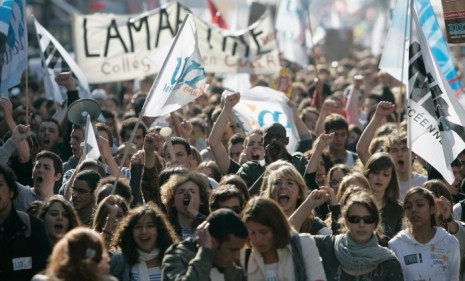France in 'chaos'
Gas stations are shut. Stores are out of food. Rioters are clashing with police. Why is France in such disarray?

A free daily email with the biggest news stories of the day – and the best features from TheWeek.com
You are now subscribed
Your newsletter sign-up was successful
France is close to crisis after a seventh day of national demonstrations against the government. Schools, government offices, and stores were empty, and as many as 2,500 gas stations were shuttered. Cities across the nation have seen violent riots. Just what are the French so worked up about? (Watch rioters clash with French police)
Why are millions of French protesting?
The demonstrations — nicknamed la manifestation — are against a law making its way through parliament that would raise the retirement age from 60 to 62, and the age at which full pensions are paid out from 65 to 67. That may sound petty, says Lizzy Davies in The Guardian, but for the French "the reform is unjust, hitting hardest women, workers in hazardous jobs and those who start work at a young age – and worth fighting against tooth and nail."
The Week
Escape your echo chamber. Get the facts behind the news, plus analysis from multiple perspectives.

Sign up for The Week's Free Newsletters
From our morning news briefing to a weekly Good News Newsletter, get the best of The Week delivered directly to your inbox.
From our morning news briefing to a weekly Good News Newsletter, get the best of The Week delivered directly to your inbox.
How are they fighting?
Up to 3.5 million took to the streets in Paris on Tuesday, as the latest in a series of general strikes was held by the country's powerful trades unions. France's oil refinery workers have been on strike for a week, meaning around a fifth of the country's gas stations have run dry and airline flights have been grounded. Some truck drivers "staged 'escargot,' or snail protests, driving in teams very slowly on the highways." In schools, hundreds of thousands of children have put down their pens in solidarity with the union workers.
What about the street violence?
While there has been some, it hasn't been as serious as that seen in Greece over the summer. In Paris and Lyon, youths and students clashed with riot police and destroyed cars and shopfronts. There were some arrests, but no reports of serious injuries. There is cause for concern though, says Kim Willsher at The Daily Telegraph. These demonstrations recall the "Soixante Huitards" of 1968, when students and union workers combined to bring the country to a standstill. "Since 1968 politicians have taken to watching the mobilisation of youngsters like one watches boiling milk," according to one French political analyst.
A free daily email with the biggest news stories of the day – and the best features from TheWeek.com
When is this likely to end?
The Senate will pass the pensions bill by the by the end of this week. That's likely to put a cap on things, says The Economist, as "French unions like their holidays too much to organize strikes during the school break." But if the flickers of protest turn into "disorganized chaos," it will be a severe test of President Nicolas Sarkozy's leadership.
What could Sarkozy do if things get worse?
After vowing not to back down in the face of the protests, he has already ordered police to forcefully reopen the fuel depots, reports The New York Times. Calling in paramilitary police is a sure sign that "confrontations should increase over the next few days," says Greg Palkot at Fox News. Then again, "change has never been easy in France."
Sources: Fox News, The Economist, The Daily Telegraph, The New York Times, The Guardian
-
 Political cartoons for February 16
Political cartoons for February 16Cartoons Monday’s political cartoons include President's Day, a valentine from the Epstein files, and more
-
 Regent Hong Kong: a tranquil haven with a prime waterfront spot
Regent Hong Kong: a tranquil haven with a prime waterfront spotThe Week Recommends The trendy hotel recently underwent an extensive two-year revamp
-
 The problem with diagnosing profound autism
The problem with diagnosing profound autismThe Explainer Experts are reconsidering the idea of autism as a spectrum, which could impact diagnoses and policy making for the condition